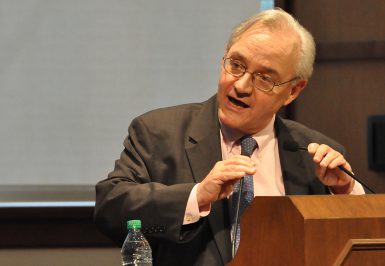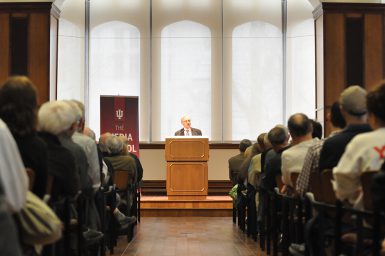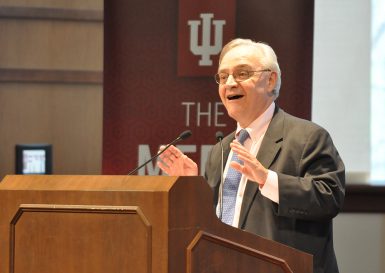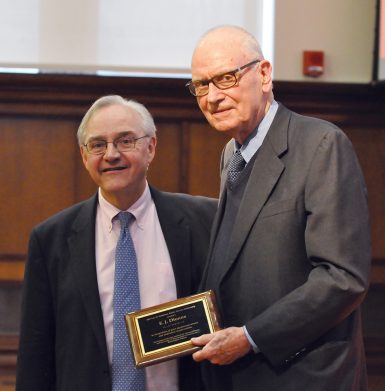E.J. Dionne discusses polarization, need for empathy

After the last election, America’s polarized politics are more pronounced than ever, columnist E.J. Dionne told a crowd in Presidents Hall Monday afternoon. And the only way American politics may recover is if people develop empathy to understand one another’s views.
The Washington Post syndicated columnist and author titled his talk “Lee Hamilton Wouldn’t Recognize the Place: What Has Become of Politics in Washington?” He spoke in front of a standing room-only crowd that included the former U.S. Congressman, who later presented Dionne with the Lee H. Hamilton Public Service Fellowship award.
Dionne said the recent attempt to repeal Obamacare is a reminder of how far this country is from the days of Hamilton problem-solving. When Hamilton first went to Washington as a member of the House of Representatives, he built a reputation of an exceptionally hard worker who would reach across party lines, Dionne said.

“He told me today that the thing you most need in politics is energy, and he had energy,” Dionne said of Hamilton, who now is a distinguished scholar in IU’s School of Global and International Studies. “He worked hard and he was willing to go across to Republicans to address big issues.”
In this country’s polarized political climate, reaching across is rare. Dionne does not attribute equal blame to the polarization of the two political parties, however. Instead, he discussed an asymmetric polarization where Republicans have moved more to the right than Democrats have moved to the left.
“Many more Democrats are likely to say they’re moderate or conservative than Republicans are likely to say they’re liberal,” Dionne said.
In his latest book, How the Right Went Wrong, he said polls found that 59 percent of progressives preferred politicians who compromised, while only 36 percent of conservatives felt that way.
This current crisis in the conservative movement is a problem for everyone, he said, because “we need conservatives to criticize and challenge,” to offset and contribute ideas. Instead, that type of discussion is not happening.
As an example, Dionne cited the recent failure to repeal the Affordable Care Act, or Obamacare.
“Democrats want to improve the ACA, but when the debate starts with the only purpose of repealing it, this demonstrates a broader problem,” he said.

Legislators’ attitudes reflect those of citizens, many of whom don’t try to understand people with opposing opinions. This divisiveness means there’s little effort to have meaningful conversations, let alone tolerance.
Dionne has a prescription for the issue: empathy. He said Republicans need to soul-search about the nature of conservatism, and Democrats need to be wary of writing off all the fears of change in this country and all that motivates opponents as bigotry.
To do this, he said, the country must start a dialogue with citizens and not allow their empathy to be selective. People need to empathize with those with different opinions from themselves to solve social, political and economic problems.
“I really think this empathy demands something of all of us regardless of our politics,” Dionne said. “We need to be able to empathize with those who are very different from us, who we may not agree with on many things.”

After the talk, Dionne fielded a few questions from the audience, which included students as well as area residents.
Susan and David Jones said they found the event thought-provoking. They read Dionne’s column each Sunday and have seen him on TV news programs.
“We need to avoid the illusion of singular identities and instead embrace a culture of multiple identities,” David Jones said. Embracing multiple views could help American citizens to empathize with others’ objections and oppose hateful expressions of those objections.
Dionne also was on campus as a guest of The Media School’s Speaker Series, which brings media professionals to campus each semester for talks that are free and open to the public.
More:
- Read about Peter Hessler, the next Speaker Series guest.
- See previous Speaker Series guests and read stories about talks.

